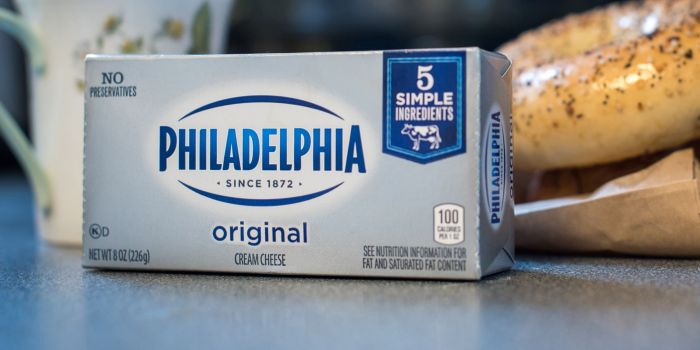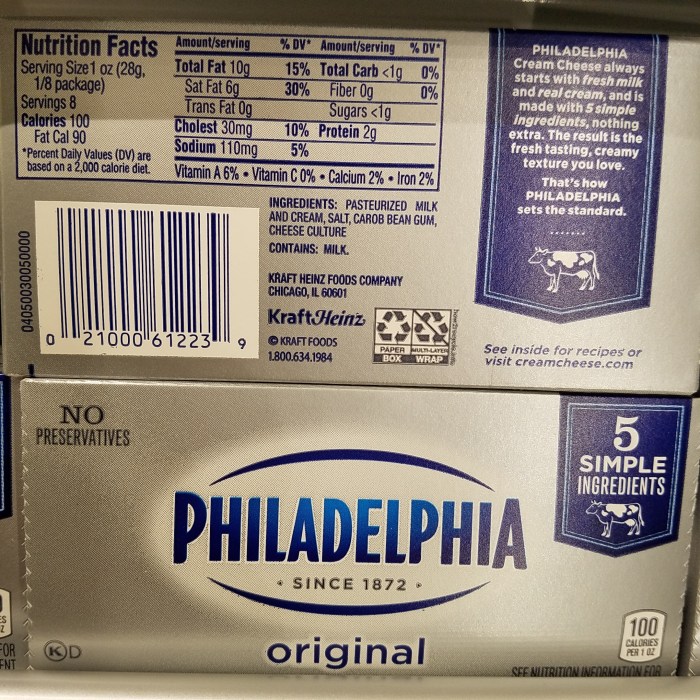Nutritional Composition of Philadelphia Cream Cheese

Nutrition facts on philadelphia cream cheese – Philadelphia cream cheese, a staple in many kitchens, offers a creamy texture and rich flavor. However, understanding its nutritional profile is crucial for making informed dietary choices. This section will delve into the macronutrient composition, essential vitamins and minerals, and the types of fats present in a typical serving.
Macronutrient Breakdown per Serving
A standard serving of Philadelphia cream cheese (approximately 30 grams or one ounce) contains roughly 100 calories. This is distributed among macronutrients as follows: approximately 8 grams of fat, 2 grams of protein, and 1 gram of carbohydrate. The percentage of daily value (%DV) varies depending on individual dietary needs and recommended daily intake, but these values generally represent a small percentage of the recommended daily allowance for each macronutrient.
It’s important to remember that this is just one serving, and the total caloric and macronutrient intake will increase with larger portions.
Vitamins and Minerals in Philadelphia Cream Cheese
Philadelphia cream cheese provides small amounts of certain vitamins and minerals. For example, a serving may contain approximately 2% of the recommended daily value of calcium, contributing to bone health. The amount of Vitamin A and Vitamin D is generally negligible. It’s important to note that cream cheese is not a primary source of these vitamins and minerals; relying on a balanced diet rich in fruits, vegetables, and other dairy products is essential for meeting daily requirements.
Specific values may vary slightly depending on the manufacturing process and ingredient sourcing.
Fat Content and Health Implications
Philadelphia cream cheese is primarily composed of fat. Understanding the types of fats present is essential for evaluating its potential health impact.
| Type of Fat | Amount per Serving (approximate) | Percentage of Total Fat | Health Implications |
|---|---|---|---|
| Saturated Fat | 6 grams | ~75% | High saturated fat intake is associated with increased LDL (“bad”) cholesterol levels, potentially raising the risk of heart disease. Moderation is key. |
| Unsaturated Fat | 2 grams | ~25% | Unsaturated fats, including monounsaturated and polyunsaturated fats, can have beneficial effects on heart health when consumed as part of a balanced diet. |
It is crucial to consume Philadelphia cream cheese in moderation as part of a balanced diet. While it offers a delightful taste and creamy texture, its high fat content should be considered when planning meals and snacks.
Comparison with Other Cream Cheese Brands: Nutrition Facts On Philadelphia Cream Cheese

Understanding the nutritional differences between various cream cheese brands is crucial for making informed dietary choices. While Philadelphia cream cheese serves as a benchmark, comparing it to other popular brands reveals variations in fat, sodium, and calorie content, influencing overall health implications. This comparison will highlight these key differences and shed light on potential impacts on consumers’ health.
Nutritional Comparison of Cream Cheese Brands
The following table presents a comparison of Philadelphia cream cheese with two other leading brands, assuming a standard serving size of approximately 30 grams (approximately one ounce). Note that specific nutritional values may vary slightly depending on the product packaging and production batch. These figures are approximate and based on readily available information from brand websites and nutritional databases.
| Nutrient | Philadelphia Cream Cheese | Brand B Cream Cheese | Brand C Cream Cheese |
|---|---|---|---|
| Calories | ~100 | ~95 | ~110 |
| Total Fat (g) | ~10 | ~9 | ~11 |
| Saturated Fat (g) | ~6 | ~5.5 | ~6.5 |
| Sodium (mg) | ~100 | ~110 | ~90 |
| Carbohydrates (g) | ~1 | ~1 | ~1.5 |
| Protein (g) | ~2 | ~2 | ~2 |
Variations in Fat, Sodium, and Calorie Content, Nutrition facts on philadelphia cream cheese
As the table illustrates, there are noticeable, albeit often small, differences in the fat, sodium, and calorie content across these three brands. Brand B tends to have slightly lower fat and calorie counts compared to Philadelphia and Brand C, while Brand C shows a higher calorie and fat content. Sodium levels vary slightly, with Brand B exhibiting a slightly higher sodium content than the others.
These variations can significantly impact individuals following specific dietary restrictions, such as low-sodium or low-fat diets. For example, a person on a low-sodium diet might prefer Brand C, while someone focused on minimizing fat intake might opt for Brand B.
Adeh, talking about nutrition facts on Philadelphia cream cheese, it’s something we all should pay attention to, especially the fat content, ya sayang. But did you know that lighter options exist? For a closer look at the nutritional breakdown of a lower-fat alternative, check out this helpful resource on whipped cream cheese nutrition. Understanding these differences helps us make healthier choices, so we can still enjoy our cream cheese without feeling too guilty, kan?
Back to Philadelphia, remember to always check the label for the complete nutritional information, ok sayang?
Ingredient List Differences and Nutritional Value
While the core ingredient in all cream cheese brands remains pasteurized milk and cream, variations exist in the inclusion of stabilizers, emulsifiers, and other additives. These minor differences can subtly affect the overall nutritional profile and texture. For instance, the presence of certain stabilizers might slightly alter the fat content or the way the body processes the cream cheese.
Some brands might use natural ingredients like guar gum, while others might rely on synthetic options. A detailed comparison of ingredient lists across these brands would reveal these nuances, which could be relevant for consumers with specific sensitivities or preferences regarding food additives. For instance, some individuals may choose brands that avoid certain artificial additives or preservatives.
Potential Health Effects and Concerns
Philadelphia cream cheese, while undeniably delicious, presents a complex picture when considering its impact on health. Its creamy texture and rich flavor stem from a high fat and sodium content, which, when consumed in excess, can contribute to various health concerns. A balanced approach, mindful of portion sizes and overall dietary habits, is crucial in mitigating potential risks.
Philadelphia cream cheese, like many dairy products, offers some nutritional benefits. It’s a source of calcium, which is essential for bone health. However, these benefits are often overshadowed by the potential negative impacts associated with its high saturated fat and sodium content.
Saturated Fat and Sodium Intake
Excessive consumption of saturated fat is linked to increased levels of LDL (“bad”) cholesterol, a major risk factor for cardiovascular disease. Philadelphia cream cheese contains a significant amount of saturated fat per serving. Similarly, its high sodium content can contribute to high blood pressure, another key risk factor for heart disease and stroke. For example, a typical serving of Philadelphia cream cheese might contain a substantial portion of the recommended daily intake of saturated fat and sodium, leaving little room for these nutrients from other sources in the diet.
Regular and excessive consumption can easily lead to exceeding recommended daily limits.
Impact on Cholesterol and Cardiovascular Health
The high saturated fat content in Philadelphia cream cheese directly influences blood cholesterol levels. Saturated fat raises LDL cholesterol, increasing the risk of plaque buildup in arteries (atherosclerosis). This plaque buildup can narrow arteries, reducing blood flow and potentially leading to heart attacks or strokes. Individuals with pre-existing cardiovascular conditions or a family history of heart disease should be particularly cautious about their Philadelphia cream cheese consumption.
A diet high in saturated fat, like one that includes large quantities of Philadelphia cream cheese, increases the likelihood of experiencing these serious health consequences. Consider a patient with high cholesterol who regularly consumes several servings of cream cheese daily – their cholesterol levels would likely be significantly elevated, putting them at a greater risk for cardiovascular complications.
Helpful Answers
Is Philadelphia cream cheese suitable for a low-carb diet?
It depends on the variety and serving size. Full-fat Philadelphia cream cheese is relatively high in carbohydrates compared to some other dairy products. However, portion control is key for those following a low-carb diet.
Does Philadelphia cream cheese contain any artificial sweeteners?
Most standard Philadelphia cream cheese varieties do not contain artificial sweeteners. However, it’s always advisable to check the ingredient list on the specific product you’re purchasing.
Can I freeze Philadelphia cream cheese?
Yes, you can freeze Philadelphia cream cheese, although the texture might change slightly upon thawing. It’s best to freeze it in smaller portions for easier use.
What are the best substitutes for Philadelphia cream cheese?
Depending on the application, alternatives include Greek yogurt (for savory uses), ricotta cheese, or other cream cheese brands. However, the nutritional profile will vary.



